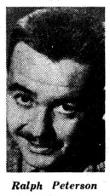'Ralph Peterson was educated at the Glen Osmond and Unley Central schools [Adelaide]. At fourteen he became a child actor working in professional theatre and was writing for radio and revue by the time he was sixteen. Between 1937 and 1942 he played the schoolboy Bottomley in the long running radio comedy serial Yes What?, as well as writing some of the episodes. In 1942 he enlisted in the Australian Army and served with an artillary unit in the Pacific area. He was later transferred to the 1st Australian Broadcast Control unit. After discharge he wrote film commentaries for Cinesound, radio scripts for Roy 'Mo' Rene, Jack Davey and Dick Bentley and a series of features and verse plays for the Australian Broadcasting Commission.'
During a stint in London with the British Broadcasting Corporation, Peterson wrote comedy scripts for comedians Tony Hancock and Benny Hill. He contributed scripts to radio series such as The Impostors (as series of discrete plays on famous fakes and frauds). He also wrote episodes for such British television series and anthology programs as Armchair Theatre, ITV Play of the Week, and No Hiding Place.
In Australia, he wrote episodes of such programs as Spyforce, Whiplash, The Rovers, Castaway, and Home Sweet Home.
Peterson is perhaps most renowned for writing three award-winning television series: My Name's McGooley, What's Yours (1966-1969), Rita and Wally (1968) and Snake Gully with Dad and Dave (1972).
Source of quotation: The Third Secretary (1972), p.8.
 5021361077365553119.jpg
5021361077365553119.jpg